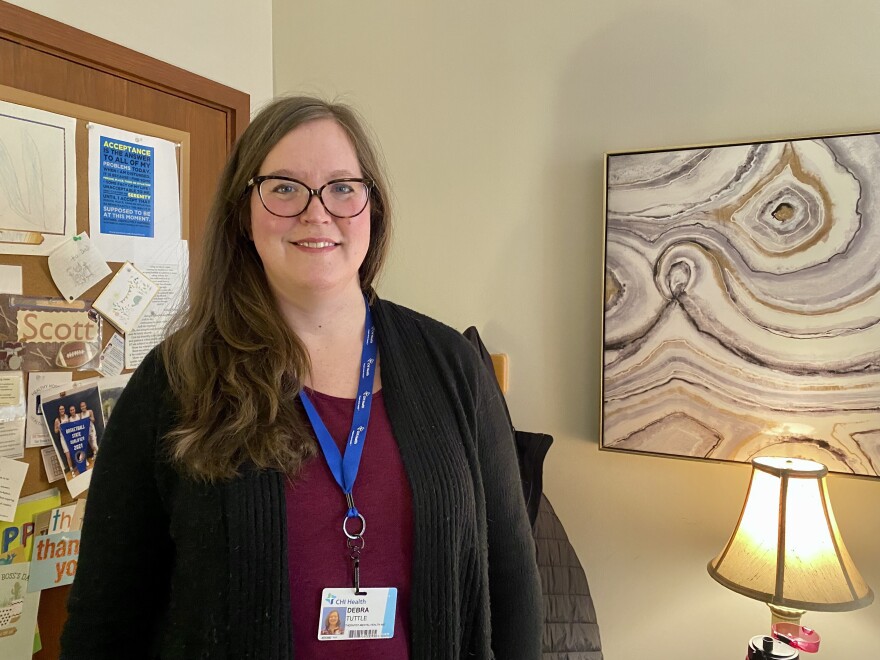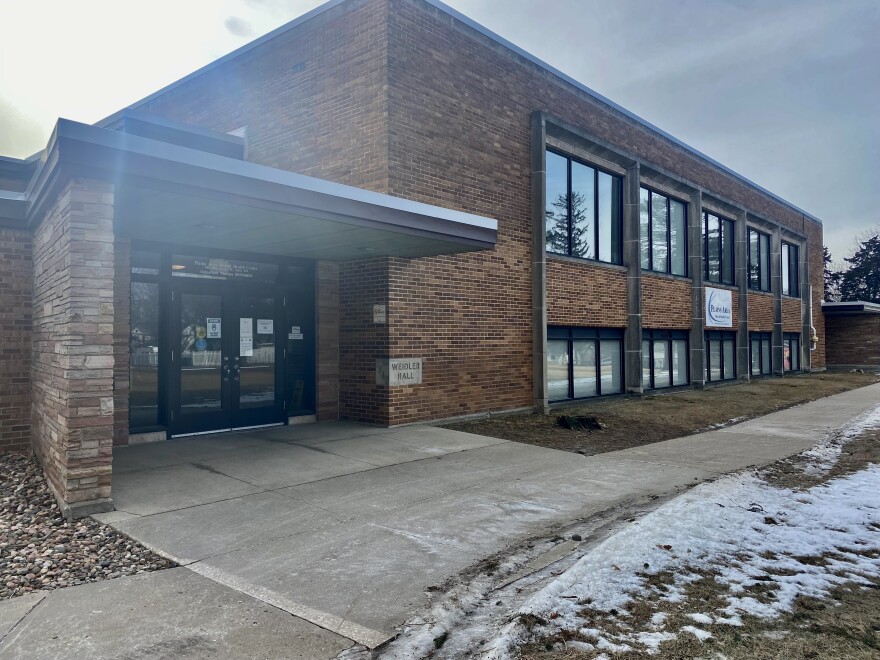When Deb Tuttle was diagnosed with long-haul COVID-19, she didn’t think of herself. She thought of her patients at the behavioral clinic in Council Bluffs where she works as a therapist.
Since her first bout of COVID in August of 2020, she has had to deal with recurring symptoms. The days where she wakes up with a fever or cough are unpredictable, but not uncommon. When she has to call in sick, she’s hit with a feeling of guilt.
“I feel bad,” she said. “I just feel like I'm letting people down, and I don't want to do that. I don't like doing that.”
For Tuttle, taking off work means one less therapist at CHI Health Psychiatric Associates – where they’re already fending off a shortage of staff. Workforce shortages are plaguing many industries, and mental health providers across Iowa have not been immune. The shortages are crippling efforts to bring timely mental health care to western Iowa.

Between their locations in Missouri Valley and Council Bluffs, the clinic needs five more therapists to fill the gaps. That’s not to mention the additional listings for psychiatrists and support staff. Clinic administrator Scott Halverson said the staffing shortage has a direct impact on the level of care they can bring.
If patients want continuing care with a therapist, they’ll likely have to wait around a month for services. Halverson said that’s coming at a time when the clinic is seeing a 14 percent increase in people seeking care.
“They gradually might begin to re-engage in some unhealthy coping patterns, like drinking or other self-destructive kinds of behavior,” Halverson said. “So if a person has the courage to make that call, we'd like to be able to be there for him as close to that phone call as possible.”
They’re not the only provider feeling the strain. Across western Iowa, mental health providers are struggling to find enough staff. It’s hurting many communities who were already facing significant barriers to treatment – like rural areas.

In northwest Iowa, rural providers who were already struggling to recruit workers are now reaching a new level of urgency. Plains Area Mental Health is a community care center with 14 offices across the region. CEO Kim Keleher describes the organization as northwest Iowa’s “safety net.”
“We don’t turn anybody away regardless of ability to pay,” Keleher said.
She said that promise has been harder to keep in the last year. Even after increasing pay, they still have four unfilled therapist positions. One job advertisement published over a year ago has yielded no results.
While the non-profit has still been able to provide open access care, Keleher said it’s been a stressor on staff. Each therapist is often taking on 10 clients every day of the week. They’ve seen turnover recently, with staff leaving for the higher rates and more flexible scheduling that private practice provides.
“The biggest concern is if we dropped down to a level that we would have to close an office or put people on a waiting list, and we have never done that,” she said. “I will avoid that at all costs. I still think that people need to be seen when they need to be seen, and they're seeking our help for a reason.”

It wouldn’t be the first service in northwest Iowa to close its doors due to staffing. CEO of the Sioux Rivers mental health region, Shane Walter, said many providers have had to halt services in the six county area – especially services for those in crisis.
Residential treatment facilities have shut down in droves and not enough alternate in-patient options have sprung up to replace them. The result is people in mental health crises are often spending days in an emergency room, waiting for a bed to open up for them.
“If you don't have a provider that's willing and able to take that individual, what do you do?” Walter asked. “I hate to admit it, but there have been situations where we've had to take people to the homeless shelters, in Sioux City or Sioux Falls, just for somewhere for them to be.”
"They've talked about it being a crisis in terms of staffing for the last four or five years. Now, I hear my colleagues talking about catastrophe.”Matt Buley, CEO of Hope Haven
Walter said there’s a dire need for more community-based living homes like the ones that Hope Haven operates. The Rock Valley-based non-profit supports those with intellectual disabilities or severe mental health issues who cannot live on their own. They rely on direct support staff to assist clients on a 24/7 basis.
But, with 83 positions open, the organization is operating without 10 percent of the workers it needs. The organization’s CEO Matt Buley said it’s an untenable situation.
“We really can't see it get worse, to be honest with you, in our industry,” he said. “They've talked about it being a crisis in terms of staffing for the last four or five years. Now, I hear my colleagues talking about catastrophe.”
He said they’ve already had to close a few homes and reduce their number of beds.
It worries Kimber Patterson, who manages community living services for the organization. When she should be checking emails, she’s often looking at the number of positions open. At times, she’s had to pitch in, working shifts in the homes when no one else is available.

But, she said she mostly worries about the stress it places on the clients every day.
“In some of our houses, we have picture schedules because they're so concerned about who's going to be working in their home. So when they see a day that's still blank because we don't have somebody there, and we're still working on it, that can increase anxiety for them.” she said. “And it's hard for them to understand that somebody will be here, we just don't know who that is yet.”
Those have been hard conversations to have. But the even harder ones, Patterson said, are the ones where they’ve had to turn people away.
“We all get into this field because we want to make a difference in people's lives,” she said. “So, you wonder ‘Where are they going to go?’ and you just hope they find a place that can meet their needs better than you can.”
Correction: An update has been made to this story to correct the spelling of Kim Keleher's name.





